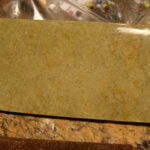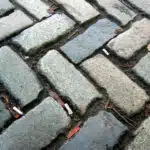When it comes to renovating a bathroom, the shower is one of the most important features to consider. With a plethora of materials available, choosing the right one can be overwhelming. Many homeowners are drawn to natural stone for its beauty and durability, but wonder if it’s practical for use in a shower. As a natural stone expert, I am frequently asked whether or not natural stone is suitable for this type of application.
While natural stone can undoubtedly add elegance and sophistication to any bathroom, it’s essential to understand its properties and limitations before making a decision. The porous nature of some types of natural stone means that they may absorb water, which could lead to mold or mildew growth over time. Additionally, some stones may be more prone to staining or etching from harsh chemicals commonly found in soaps and shampoos. In this article, we will explore the pros and cons of using natural stone in showers and provide guidance on how to choose the best type of stone for your needs.
Understanding The Properties Of Natural Stone
Once upon a time, natural stone was the only building material available to humanity. In the modern era, this material is still prized for its durability, beauty, and uniqueness. The properties of natural stone are determined by its geological origins and mineral composition. Some of the most common types of natural stone used in construction include granite, marble, limestone, sandstone, and travertine.
Natural stone is renowned for its unique properties that make it a popular choice for many applications including bathroom designs. One of the strengths of natural stone is its durability; it can withstand harsh weather conditions and heavy foot traffic without sustaining damage. Additionally, natural stone is low maintenance; it requires minimal cleaning and does not deteriorate over time. However, it also has some weaknesses; natural stone can be prone to chipping or cracking if subjected to excessive force or impact.
The science behind natural stone gives insight into how these unique properties come about. Natural stone forms over millions of years through geological processes such as volcanic activity or sedimentation. The pressure exerted on minerals during formation creates a strong bond between them that results in the hardness and durability characteristic of natural stones. By understanding the science behind natural stones’ properties, builders can use them effectively in various applications such as showers with confidence.
Moving forward to explore how advantageous using natural stones in shower designs can be without any further ado: , here are some of the benefits of using natural stones in shower designs.
Advantages Of Natural Stone In Showers
Natural stone is a popular choice for shower installations due to its unique beauty and durability. One of the biggest advantages of using natural stone in showers is that it adds a touch of elegance and luxury to any bathroom, creating a spa-like atmosphere. The texture, color, and veining patterns found in natural stone are all unique, making each installation one-of-a-kind.
When it comes to cleaning methods, natural stone requires special care to maintain its appearance and prevent damage. It is important to avoid acidic or abrasive cleaners that can etch or scratch the surface. Instead, use a pH-neutral cleaner specifically designed for natural stone. Regular maintenance such as wiping down surfaces with a soft cloth after each use and sealing the stone periodically will also keep it looking its best.
The installation process for natural stone in showers can be more complex than other materials. It requires skilled professionals who have experience working with this type of material. Proper preparation of the shower substrate and waterproofing are crucial steps in ensuring the longevity of the installation. Despite the extra effort required during installation, the end result is well worth it as natural stone provides unmatched beauty and durability for years to come.
Moving forward, let’s discuss the durability and longevity of natural stone in shower installations. Despite being more susceptible to scratches and chips than some other materials, such as ceramic tile or acrylic panels, when properly sealed and maintained, natural stone can last for decades without losing its beauty or functionality. In fact, with proper care, it may even improve over time by developing a patina that adds character to your shower installation.
Durability And Longevity
Natural stone is a popular choice for shower flooring and walls. It provides an elegant and timeless look that can enhance the overall aesthetics of any bathroom. However, before choosing natural stone for your shower, it’s important to weigh the pros and cons of using this material.
One of the biggest advantages of natural stone in showers is its durability. Natural stones like granite, marble, and slate are known for their strength and can withstand heavy foot traffic without cracking or chipping. Additionally, these stones are resistant to moisture and stains which makes them ideal for use in a wet environment like a shower. However, it’s important to note that some types of natural stones may require regular sealing to maintain their water resistance properties.
When considering the cost effectiveness of using natural stone in a shower, it’s important to keep in mind that while the initial cost might be higher than other materials like ceramic tiles or vinyl sheets, natural stone has a longer lifespan. This means that you won’t have to replace your shower flooring or walls as often as you would with other materials which can save you money in the long run.
Moving forward into enhancing aesthetics and style, homeowners have plenty of options when it comes to choosing natural stones for their showers. From classic marble to rustic slate, there are many different types of stones that can add an extra layer of sophistication to any bathroom design. The unique pattern and texture variations found in each piece of natural stone make every installation one-of-a-kind which only adds more value to your investment.
Enhancing Aesthetics And Style
Durability and longevity are crucial factors to consider when choosing the material for your shower. However, natural stone offers more than just that. It provides design flexibility that allows you to create a unique and stunning space that reflects your personal style. Just like how every individual has their own personality and preferences, each type of natural stone has its distinct characteristics and beauty.
Using natural stone in your shower requires installation considerations. The weight and thickness of the material must be taken into account to ensure proper support. It is also important to choose the right sealer for your stone to prevent water damage and staining over time. Working with an experienced professional can help ensure proper installation and maintenance of your natural stone shower.
In addition, natural stone in showers offers a variety of benefits such as slip-resistance, hypoallergenic properties, and easy cleaning. Its unique texture adds an element of sophistication and luxury to any bathroom design. With the right care, it can last for decades without losing its beauty or functionality. Natural stone showers are not only visually appealing but also serve as a practical investment for your home.
However, there are some disadvantages of using natural stone in showers that must be considered before making a decision. These include higher costs compared to other materials, susceptibility to chipping or cracking if not installed properly, and potential growth of mold or mildew in porous stones if not regularly maintained. Despite these drawbacks, many homeowners still choose natural stone for their showers because of its beauty and durability when properly cared for.
Disadvantages Of Natural Stone In Showers
Despite its many benefits, natural stone is not without its disadvantages when it comes to shower applications. Firstly, natural stone is porous, which means that it can absorb water. This can lead to the growth of mold and mildew if the shower is not properly sealed or waterproofed. Additionally, the porosity of natural stone means that it can be more difficult to clean than non-porous alternatives.
Another disadvantage of using natural stone in showers is that it can be quite expensive compared to other materials. This may deter some homeowners from choosing natural stone as a shower material, especially if they are on a tight budget. However, those who do choose natural stone will benefit from its durability and longevity.
If you do decide to use natural stone in your shower, there are several waterproofing solutions available that can help prevent water damage and ensure the longevity of your investment. These include sealing products and specialized coatings that create a barrier between the stone and water. Alternatively, there are many alternative shower materials available that mimic the look of natural stone while providing better resistance to water damage.
In summary, while natural stone may have some disadvantages when used in showers due to its porosity and cost, there are effective waterproofing solutions available for those who choose this material. Additionally, alternative shower materials are available for those who desire a similar aesthetic but require better resistance to water damage. In the next section we will explore further how porosity affects the use of natural stone in showers and what steps can be taken to mitigate this issue.
Porosity And Water Absorption
Porosity is an important factor to consider when selecting a natural stone for use in a shower. It is essential to understand the characteristics of a particular stone in order to determine if it is suitable for wet applications. The porosity of a stone can range from impermeable to highly permeable, so it is important to consider the absorption rate of the stone when selecting it for a wet application. Water absorption can vary greatly depending on the type of stone, and if the stone is left unsealed, it can absorb large amounts of water, leading to damage. Therefore, it is recommended to seal natural stone that will be used in wet areas to help protect it from water and other environmental elements. Ultimately, properly sealing natural stone is the best way to ensure its longevity and protect it from water damage.
Porosity Of Stone
Natural stone is a popular choice for shower floors and walls due to its striking appearance and durability. However, before installing natural stone in a shower, it is important to consider the stone’s porosity. Porosity refers to the amount of open space within the stone that can absorb water.
Some types of natural stone, such as marble or limestone, are highly porous and require sealing to prevent water absorption. Sealing requirements vary depending on the type of stone and the level of exposure to water. For example, a shower floor made from travertine may need to be sealed more frequently than a wall made from granite due to its closer proximity to standing water.
When selecting natural stone for a shower, it is also important to consider its overall water resistance. While some stones may be highly porous, they may also possess high levels of water resistance that make them suitable for use in wet environments. It is important to consult with a natural stone expert who can provide insight into the best options for your specific project based on factors such as porosity and water resistance.
In conclusion, while natural stone can be used in a shower, it is crucial to choose a type of stone that is appropriate for wet environments by considering factors such as porosity and water resistance. When properly installed and maintained with regular sealing requirements, natural stone can create an elegant and long-lasting addition to any shower design.
Water Absorption Of Stone
In addition to porosity, another crucial factor to consider when choosing natural stone for a shower is its water absorption. Water absorption refers to the ability of the stone to soak up water, which can lead to damage and deterioration if not properly addressed. To prevent this, it is important to select a type of natural stone that has sufficient water resistance for use in wet environments.
There are several waterproofing techniques available that can help enhance the water resistance of natural stone in showers. One common option is sealing, which involves applying a protective coating to the surface of the stone that helps repel water and other liquids. Sealing options vary depending on the type of stone and level of exposure to water, so it is important to consult with an expert who can provide guidance on the most suitable solution for your specific project.
In addition to sealing, other waterproofing techniques may include using specialized grouts or adhesives that are designed for use in wet areas. These products can help create a more secure and watertight bond between the natural stone tiles and prevent moisture from seeping through. By taking steps to enhance the water resistance of natural stone in showers, you can help ensure its longevity and maintain its aesthetic appeal over time.
Sealing Natural Stone
Natural stone is a popular choice for showers due to its durability, aesthetic appeal, and natural beauty. However, one critical factor that needs to be considered when selecting natural stone for shower use is its porosity and water absorption. Porosity refers to the amount of open space within the stone that can absorb water, while water absorption pertains to the ability of the stone to soak up moisture. These two factors can significantly impact the longevity and maintenance of natural stone in wet areas such as showers.
One effective technique for enhancing the water resistance of natural stone in showers is sealing. Sealing involves applying a protective coating or impregnator on the surface of the stone that helps repel water and other liquids. This process fills in any pores or cracks in the material, preventing moisture from seeping through and causing damage. Sealing techniques vary depending on factors such as the type of natural stone used and level of exposure to water.
Proper sealing is an essential part of natural stone maintenance in showers, as it can help prolong its lifespan and maintain its appearance over time. It is recommended that sealing be done by a professional with experience working with natural stones. They can provide guidance on which sealant products are best suited for specific types of natural stones, as well as offer tips on how often resealing should be done based on usage and wear patterns. By investing in proper sealing techniques, homeowners can ensure their natural stone shower remains beautiful and functional for years to come.
Risk Of Mold And Mildew Growth
After discussing the porosity and water absorption of natural stone, the question arises: can you use natural stone in a shower? The answer is yes, but with some considerations. Natural stone can create a stunning and luxurious look in a shower, but it is crucial to prevent mold and mildew growth.
Preventing mold and mildew growth in a natural stone shower requires proper cleaning techniques. Regular cleaning with non-acidic cleaners that are specifically formulated for natural stone is essential. Avoid using abrasive cleaners or scrubbers that can scratch the surface of the stone and create areas for mold to grow. After cleaning, thoroughly rinse the surface with clean water and dry it completely to avoid any moisture buildup.
Despite proper cleaning techniques, natural stone showers are still susceptible to staining and etching. Certain types of natural stones such as marble or limestone are more prone to etching due to their chemical composition. Even water droplets can leave marks on these types of stones if left untreated for an extended period. Therefore, it’s important to consider the type of natural stone being used in a shower and its susceptibility to staining and etching before installation. However, even with this risk factor, natural stone can still be an excellent choice for creating a luxurious shower experience when properly cared for.
Susceptibility To Staining And Etching
One of the main concerns with using natural stone in a shower is its susceptibility to staining and etching. Natural stones such as marble, granite, and travertine are porous materials that can easily absorb water, oils, and other liquids that come into contact with them. This absorption can lead to stains that are difficult or even impossible to remove.
Preventing staining in natural stone showers requires regular cleaning and maintenance. It is important to use a pH-neutral cleaner specifically designed for natural stone surfaces since acidic or abrasive cleaners can cause etching or damage the surface of the stone. Additionally, sealing the stone with a high-quality sealant will provide an extra layer of protection against stains by reducing the porosity of the material.
Avoiding etching in natural stone showers also requires proper care and maintenance. Etching occurs when acidic substances like vinegar, lemon juice, or harsh cleaners come into contact with the surface of the stone. These substances react with the calcium carbonate in the stone and cause it to dissolve, leaving behind dull spots or marks on the surface. To avoid etching, it’s important to clean up spills immediately and avoid using acidic cleaners on natural stone surfaces.
- Use a pH-neutral cleaner specifically designed for natural stone surfaces.
- Seal your natural stone shower regularly with a high-quality sealant.
- Avoid using acidic cleaners or substances on your natural stone shower.
It’s important to note that while preventing staining and avoiding etching can help maintain the appearance of your natural stone shower, it may not entirely eliminate these issues. However, proper care and maintenance can significantly reduce their occurrence and prolong the lifespan of your shower. In the next section, we’ll discuss different types of natural stones that are suitable for use in showers.
Types Of Natural Stone For Showers
Without a doubt, natural stone is a top choice for homeowners who want to elevate their shower’s aesthetics. Using natural stone in your shower can create a spa-like ambiance that is both elegant and relaxing. The beauty of natural stone lies in its uniqueness; no two stones are alike, meaning your shower will be one-of-a-kind. However, before deciding to use natural stone in your shower, it’s essential to weigh the pros and cons.
When it comes to using natural stone in showers, there are various types to choose from. Each type has its unique features that make them suitable or unsuitable for use in wet areas such as showers. Marble and limestone are popular options for showers due to their beautiful veining and color variations. However, they are susceptible to etching and staining from soap scum, hard water deposits, or acidic cleaning agents. Travertine is another option with similar characteristics but requires regular sealing to prevent water absorption.
Granite is one of the most durable natural stones you could use in your shower. It is non-porous, making it less prone to water damage compared to other types of natural stone. Granite also comes in various colors and patterns that can match any style preference. However, granite may require periodic sealing since it isn’t entirely resistant to etching or staining caused by harsh chemicals or prolonged exposure to acidic substances such as vinegar or citrus juices. When properly maintained, granite can last a lifetime while maintaining its stunning appearance.
Granite
Granite is a natural stone with a wide range of colors and patterns, making it a popular choice for shower walls and floors. It is one of the hardest stones available and has excellent resistance to water, stains, and scratches. Moreover, granite is easy to clean and maintain, which makes it ideal for showers.
Pros of using granite in a shower include its durability, longevity, and aesthetic appeal. Granite will stand up to the test of time, meaning that it’s unlikely to crack or chip under normal use. Additionally, granite can add value to your home since it is considered a high-end material. When compared to other materials like ceramic tile or vinyl flooring, granite may come with a higher upfront cost but offers more extended service life.
However, there are also some cons that you should consider before choosing granite for your shower. First off, granite can be expensive compared to other materials like ceramic tiles. The installation process can also be more complicated since the stone needs to be cut precisely and handled carefully due to its weight. Furthermore, some types of granites may require regular sealing depending on their porosity levels.
Next step: Marble
Marble
As the saying goes, “a thing of beauty is a joy forever.” This statement perfectly encapsulates the allure of natural stone in showers. While granite is a popular choice for shower walls and floors, marble is another option that many homeowners gravitate towards due to its elegant appearance. However, before making a decision about using marble in your shower, it’s important to consider its pros and cons.
On the positive side, marble can add an unmatched level of sophistication and luxury to any bathroom. Its unique veining patterns and color variations create a one-of-a-kind look that can’t be replicated with any other material. Additionally, marble is highly durable and resistant to heat damage, making it an ideal choice for the hot and humid environment of a shower.
On the negative side, however, marble requires regular maintenance to keep it looking its best. It’s vulnerable to etching from acidic liquids like shampoo and soap, as well as from hard water deposits. This means that homeowners need to clean their marble showers regularly with mild soaps or specialized cleaners designed specifically for marble. Furthermore, while some people appreciate the natural patina that develops on marble over time due to wear and tear, others may find this aging process unappealing.
To sum up, while there are certainly pros and cons associated with using marble in showers, its undeniable beauty makes it a top contender for those looking to create a high-end bathroom oasis. With proper care and maintenance, your marble shower can continue to shine for years to come. In the next section, we’ll explore another popular natural stone option for showers: slate.
Slate
Slate is a type of natural stone that can be used in a shower. It is formed from sedimentary rocks that have been subjected to intense heat and pressure over time. This process creates a unique texture and pattern in the stone, which makes it an attractive option for shower walls and floors.
When installing slate in a shower, it is important to use a waterproof membrane to prevent moisture from seeping into the underlying structure. The membrane should be installed over the substrate, with the slate tiles adhered directly to it using a thin-set mortar. Grout lines should be sealed with a penetrating sealer to prevent water from penetrating them.
To maintain slate in a shower, it is important to clean it regularly with a mild soap and water solution. Avoid using harsh chemicals or abrasive cleaners, as these can damage the surface of the stone. It is also important to reseal the grout lines periodically to ensure that they remain waterproof and do not allow water to penetrate into the underlying structure.
Moving on to limestone, this type of natural stone is also commonly used in showers due to its durability and beauty. Like slate, limestone must be properly installed and maintained in order to ensure its longevity and functionality in a wet environment.
Limestone
- Limestone is a sedimentary rock composed mainly of calcium carbonate and other mineral calcites.
- Limestone is often used for interior and exterior construction projects such as flooring, paving, and wall cladding.
- Limestone has many advantages, including being durable, easy to clean, and aesthetically pleasing.
- Limestone is also resistant to fire and moisture, making it a great choice for showers.
- In order to maintain the look of limestone, it is important to clean it regularly with a mild detergent.
- Sealing limestone on a regular basis will also help to protect it from staining and damage.
Uses Of Limestone
When it comes to using natural stone in a shower, limestone is an excellent option. However, understanding the characteristics of limestone is crucial before deciding to use it. Limestone is a sedimentary rock that is formed from the accumulation of shells and other fossils. It is a soft and porous stone that can absorb water and stains easily.
Despite its softness, limestone can be used in a shower with proper maintenance. To prevent damage to the stone, it is essential to seal it regularly. This will provide a protective layer on the surface, preventing water and stains from penetrating the stone. Additionally, limestone should be cleaned with pH-neutral cleaners to avoid etching or dulling of the surface.
In conclusion, limestone can be used in a shower if you understand its characteristics and take proper care of it through regular maintenance. With its unique texture and natural beauty, limestone can add elegance to any bathroom while providing functionality as well. As a natural stone expert, I recommend considering limestone for your next bathroom renovation project.
Advantages Of Limestone
As a natural stone expert, I believe that limestone is one of the best materials for bathroom renovations. One of the advantages of using limestone is its unique texture and natural beauty. Limestone comes in a variety of colors and patterns, making it a versatile material that can fit any design style. Its natural appearance adds elegance to any bathroom, creating a warm and inviting atmosphere.
Another advantage of limestone is its durability. When properly sealed, limestone can withstand moisture and wear without becoming damaged. This makes it an excellent choice for wet areas like showers because it won’t degrade or become discolored over time. Additionally, cleaning limestone is relatively easy with pH-neutral cleaners, which won’t etch or dull the surface.
Lastly, using limestone in your shower can add value to your home. Natural stone materials are highly sought after by homeowners and can increase the resale value of your property significantly. Investing in quality materials like limestone not only improves the aesthetics and functionality of your bathroom but also provides long-term benefits for you as a homeowner.
Maintenance Of Limestone
Maintaining the beauty and functionality of limestone requires proper care and maintenance. Sealing limestone is essential in protecting it from moisture, stains, and discoloration. A high-quality sealer should be applied to the surface every six months to a year, depending on the level of use. It is crucial to follow the manufacturer’s instructions carefully when applying the sealer to ensure maximum protection.
Cleaning methods for limestone are also critical in maintaining its natural beauty. Limestone should be cleaned regularly with pH-neutral cleaners that do not contain acid or abrasive substances. Harsh chemicals can damage the surface of the stone, causing it to become dull or etched. It is best to avoid using vinegar or lemon juice as they can cause discoloration over time.
In conclusion, proper care and maintenance are necessary in ensuring that your limestone surfaces remain beautiful and functional for many years. Sealing limestone and cleaning it with pH-neutral cleaners will protect its natural beauty while allowing you to enjoy its durability and elegance. Consulting with a natural stone expert can help you understand how to maintain your limestone surfaces properly.
Choosing The Best Natural Stone For Your Shower
As a natural stone expert, I often get asked whether it’s possible to use natural stone in a shower. My answer is always the same: yes, but be mindful of the type of stone and finish you choose. Natural stone can add an elegant touch to your shower design, but it also requires special care and consideration.
Choosing the right finish is crucial when selecting natural stone for your shower. A polished or honed surface can make your tiles look sleek and modern, while a tumbled or brushed finish can give them a more rustic feel. However, keep in mind that some finishes may be more slippery when wet than others. It’s important to test different finishes before making a final decision to ensure that they’re slip-resistant and safe for use in a wet environment.
Natural stone shower design ideas are endless, from classic marble tiles to earthy slate accents. When selecting your stones, consider the overall aesthetic of your bathroom as well as the functional aspects of your shower. For example, if you have a large walk-in shower with multiple walls, you may want to mix and match different types of stones for added visual interest. On the other hand, if you have a smaller space or prefer a more streamlined look, sticking with one type of stone in a consistent pattern may be best.
When it comes to choosing natural stone for your shower, there are many options available. By selecting the right finish and incorporating creative design ideas that suit both form and function, you can create a stunning and unique space that will stand the test of time. In the subsequent section, we’ll discuss maintenance and care tips for natural stone showers so that you can ensure your investment lasts for years to come.
Maintenance And Care Tips For Natural Stone Showers
After choosing the best natural stone for your shower, it is important to know how to properly maintain and care for it. One of the most crucial maintenance steps is sealing. Natural stone needs to be sealed regularly in order to protect it from water damage and staining. The frequency of sealing depends on the type of stone you have chosen, but typically it should be done every 6-12 months.
When it comes to cleaning natural stone showers, it is important to avoid using harsh chemicals that can damage or discolor the surface. Instead, opt for pH-neutral cleaning products specifically designed for natural stone. Do not use abrasive scrubbers or rough materials as they can scratch or dull the surface. Always rinse thoroughly with clean water after cleaning.
In addition to regular sealing and gentle cleaning, there are other steps you can take to prolong the life of your natural stone shower. Avoid leaving wet bath mats or towels on the surface as they can trap moisture and cause mold or mildew growth. Keep an eye out for any cracks or chips in the stone and have them repaired immediately to prevent further damage. By following these simple maintenance tips, your natural stone shower will stay beautiful and functional for years to come.
Conclusion
The use of natural stone in showers has become increasingly popular due to its unique properties and aesthetic appeal. However, it is essential to understand the advantages and disadvantages of using natural stone in a shower before making any decisions.
One of the most significant advantages of natural stone in showers is its durability and longevity. Unlike other materials, natural stone can withstand high moisture levels without deteriorating or losing its color. It also adds a touch of elegance and style that cannot be matched by other materials.
On the other hand, there are some disadvantages to consider when using natural stone in showers. For example, slate may tend to chip or scratch easily, while limestone may be prone to staining if not sealed correctly. It is crucial to choose the right type of natural stone for your shower based on your specific needs and preferences.
As a natural stone expert, I recommend that you properly maintain and care for your natural stone shower to prevent any damage or discoloration. Using the right cleaning products, sealing your shower regularly, and avoiding harsh chemicals can help prolong the life of your shower.
In conclusion, using natural stone in showers can add an element of luxury and sophistication to any bathroom. However, it is essential to weigh the advantages and disadvantages carefully before making any decisions. By choosing the right type of natural stone and taking good care of it, you can enjoy a beautiful and long-lasting shower that will enhance the overall look and feel of your bathroom.
Image Credits
- “Natural stone wall” by Field Outdoor Spaces (featured)





















![Calculating How Much Stone Dust You Need 21 [Blog Post]Stone Dust © Oxfam Australia](https://green-life.blog/wp-content/uploads/2023/05/GdZVzgTqPhjq-150x150.jpg.webp)







